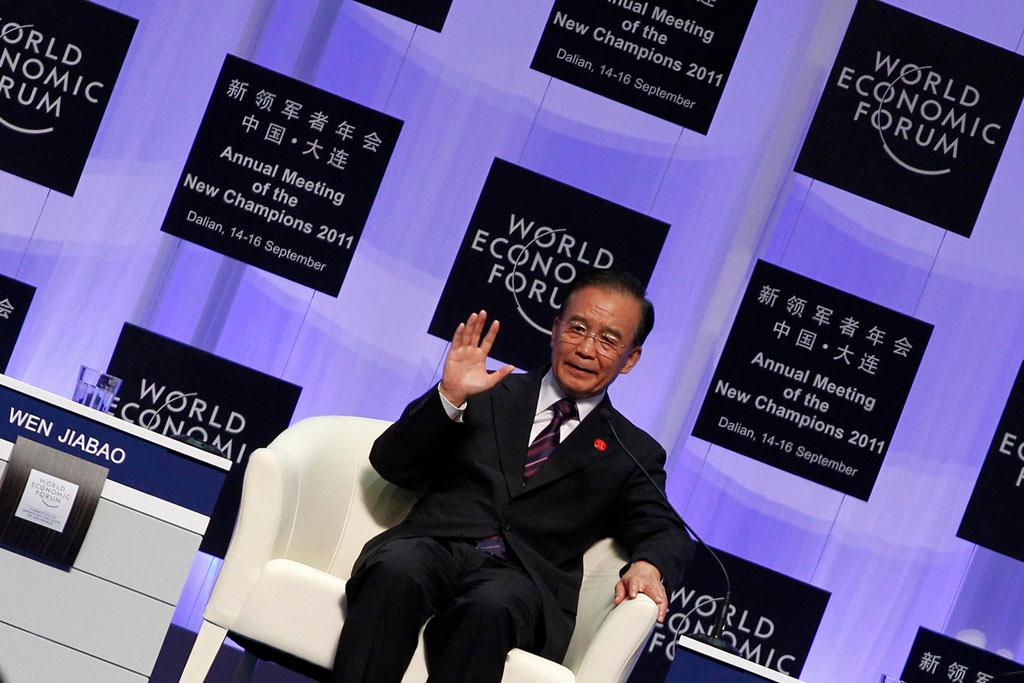China’s aid to Europe: view from Beijing
China’s Premier Wen Jiabao delivers his keynote address at the summer session of the World Economic Forum in the Chinese port city of Dalian, northeast China’s Liaoning province on Sept. 14, 2011.
BEIJING, China — Call it the latest stroke of good timing for China’s growing global clout.
With several fragile European economies looking for cash, Beijing is once again in a new position of power, angling to use cash as a political lever.
With an estimated $3.2 trillion in the bank, the world’s largest stock of foreign currency reserves, China is becoming the go-to for countries with economic troubles.
And although its credit to European countries has thus far been limited, officials have hinted recently that China might be willing to do more if the European Union is willing to change its stance to benefit China. Specifically, Beijing wants the EU to bump up its designation of China as a market economy, already scheduled by the World Trade Organization to occur automatically by 2016.
Speaking last week to the summer meeting of the World Economic Forum in Dalian, Chinese Premier Wen Jiabao delivered the message, saying the EU should take “bold steps” in its position toward China.
“Recognizing China as a full market economy is a way a friend recognizes a friend,” said Wen.
MORE ECONOMY: Beijing’s new role highlights U.S. decline
In commentary later, the official Xinhua news agency took things a step farther.
“Since eruption of the global financial crisis and the debt crisis in Europe, China has offered help to Europe,” Xinhua wrote. “For instance, China sent several delegations to Europe to purchase huge amounts of goods and services in 2009, aiming to boost Europe's economy.
“Since last year, China has purchased bonds of several European countries, trying to save nations deep in a debt crisis,” the commentary said. “By contrast, it is a pity that the EU side still shows no sincerity on the issue of recognizing China's market economy status.”
Zhao Zhongxiu, a trade and economics specialist at the University of International Business and Economics, said China wants market economy status because the designation would improve its position in global trade negotiations.
As it stands, during trade disputes at the WTO, China’s costs and products are compared with those of other countries. The market designation would place China in a more favorable position.“This puts China in a very unfavorable position,” said Zhao. “If China gained market economy status, this would no longer be the case.”
But the fact is, officials from the United States and the EU have said in recent years when China has pressed the issue, China simply has not yet met the actual qualifications of a market economy. In fact, its massive stimulus spending during and after the global financial crisis left many wondering if it had moved in the wrong direction.
In an emailed statement, a spokesman for the EU said the transformation to market economic status is a "rules-based process." The technical criteria to obtain Market Economy Status are clear,” said EU Trade Spokesman John Clancy. “It is not an issue decided upon political grounds.
“The [European] Commission's assessment shows that China is making progress,” Clancy said.
“Most laws are in place but implementation and enforcement remains to be demonstrated. Therefore, the timing of the conclusion on its Market Economy Status is largely in China's hands.”
Every day, reporters and producers at The World are hard at work bringing you human-centered news from across the globe. But we can’t do it without you. We need your support to ensure we can continue this work for another year.
Make a gift today, and you’ll help us unlock a matching gift of $67,000!
